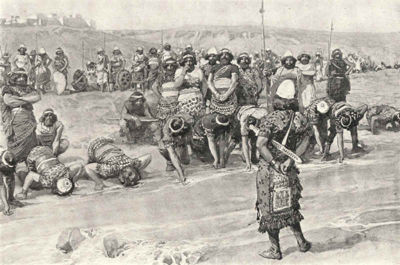Judge (Biblical)
 From Conservapedia
From Conservapedia - This article discusses the Biblical sense of the word "judge." For an ordinary judge, see Judge.

Contents
Functions and duties of a Judge[edit]
A biblical Judge had duties beyond those of a modern judge, and even beyond those of a national chief justice. The careers of the judges of the Bible had three phases, and in each phase the judge discharged one of his three primary duties.
Conviction[edit]
The first task that a Biblical judge had to perform was to convict the people of their sins. The sin in question here was a national or collective sin: turning away from God and worshiping other gods. These other gods were usually the local agricultural and fertility cults that were rife in Canaan, and included Baal and Asherah, aka Ashtoreth, aka Astarte. The modern equivalent of this sin would be the elevation in the individual or public consciousness of any God-substitute, or the elevation of man as his own god, as the "captain of his soul," as Timothy McVeigh described himself before he suffered execution.
A judge would measure his success by the genuine repentance of the people, and the demonstration of that repentance by their actions in putting away all their foreign gods and God-substitutes and serving the True God alone.
Deliverance[edit]
Once the judge had accomplished the first task, he could usually be sure of achieving the second. God always returned to deliver His people when they returned to Him. The deliverance, or liberation, was usually from a threat from a foreign power. The threat varied from raiding and pillaging to the exacting of tribute to actual invasion and occupation or, in the original case, slavery.
Administration[edit]
Once the judge had achieved deliverance, he would administer justice and keep the people focused on serving God alone for as long as he lived. This was a very difficult task, and not all of the celebrated Biblical judges performed this to Divine satisfaction. To be effective, the judge had to set a good example in his personal conduct in addition to judging cases fairly and honestly and in a Godly fashion.
Chronology[edit]
The period of the Judges begins properly with the Exodus of Israel in 15 Abib 2513 AM (12 April 1491 BC), because Moses, and not Othniel as most Bible readers suppose, is actually the first judge. It ends with the death of Samuel in 2944 AM (1060 BC). Samuel was the last of the judges. He introduced the United Kingdom of Israel and anointed its first two kings, Saul and David.
Floyd Nolen Jones, in The Chronology of the Old Testament, has determined that the lengths of the careers of the Judges are the same as the lengths that most people suppose that "the land had rest." James Ussher (The Annals of the World) worked out a somewhat different chronology, but did not adequately account for one key fact: that Jephthah's great battle against the Ammonites occurred exactly three hundred years after the conquest of Heshbon from Sihon the Amorite in the fall of 2553 AM (1452 BC), as Jephthah specifically stated in his communiqué to the Ammonites. (Judges 11:12-28 ) Jones also points out that Samson's awesome revenge against the Philistines must have occurred near the end of the Philistines' forty-year dominion over Israel, and that the Battle of Mizpah, in which Samuel rallied the Israelites to annihilate a Philistine force sent against them, must have occurred immediately after that event and twenty years after the ark of the covenant was returned to Israel after the Philistines had captured it.
Names[edit]
The line of the Judges begins with Moses and his immediate successor Joshua, because both men performed all three functions of biblical Judges. The careers of the remaining Judges are described in the Book of Judges, except for Eli and Samuel, whose careers are described in I Samuel.
Abimelech is not considered a Judge, because he was a tyrant and a fratricide. Nevertheless, his name appears in most lists of the Judges of Israel.
Bible record[edit]
References[edit]
- Floyd Nolen Jones, The Chronology of the Old Testament, Green Forest, AR: Master Books, 2004, pp. 71–104 and Charts 4, 4A, and 4B.
- James Ussher, The Annals of the World, Green Forest, AR: Master Books, 2003, pghh. 342-391
See also[edit]
| |||||||||||
Categories: [Bible] [Bible Study] [Biblical Persons] [Israel] [Judges] [Old Testament]
↧ Download as ZWI file | Last modified: 03/09/2023 17:57:06 | 68 views
☰ Source: https://www.conservapedia.com/Judge_(biblical) | License: CC BY-SA 3.0
 ZWI signed:
ZWI signed: KSF
KSF